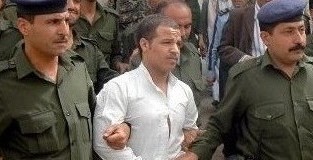|
Justice Yemen-style: Paedophile who
raped boy, 11, shot in the head in front of hundreds of spectators
By Tamara Cohen - DailyMail.co.uk
07th July 2009
This is criminal justice, Yemen style. A man accused
of raping and murdering an 11-year-old boy is paraded through his home
town before being shot dead by an executioner.
Hundreds of onlookers lined the streets to watch the
gruesome scene, cheering and shouting abuse at Yehya Hussein al-Raghwah.
The boy, Hamdi al-Kabas, had reportedly come into his
shop for a haircut last December during the Muslim festival of Eid.
After brutally attacking him, the barber cut his body into pieces and
dumped them outside the capital Sana'a.
He was given the death penalty by a Yemeni court a
month later after apparently admitting his crime.
Shocking images of his final moments were released
following the execution yesterday.
First he leaves the city's central prison, handcuffed
and dressed in white robes. Fear etched on his face, he is surrounded by
soldiers as he is led towards a ceremonial red carpet.
He is allowed to say a final prayer, his shirt is
then ripped open before he is laid face down.
As a police official reads out his sentence for the
last time, a doctor oversees his treatment and crowds - which appear to
include children - jeer and punch the air, some filming his final moment
on their mobile phones.
A soldier brandishes his machine gun at the nape of
the barber's neck, and within a split second it is all over. His death
brings the number of executions in the country this year to nine.
Yemen is one of 59 countries which retains the death
penalty, and one of its most prolific users, according to Amnesty
International.
It is deployed for a variety of violent and non-violent
crimes including apostasy and adultery.
Last year Yemen executed 13 people, according to
those Amnesty has verified. But as no official figures are released the
real toll could be far higher.
All of those died by firing squad but in recent years
there have been reports of stonings and beheadings.
The deeply religious desert country has a poor human
rights record and it is unclear if the barber had a fair trial.
Under sharia law, which applies in Yemen, relatives
of the victims of certain categories of murder have the power to pardon
the offender in exchange for compensation, grant a pardon freely or
request his or her execution.
|

